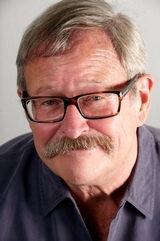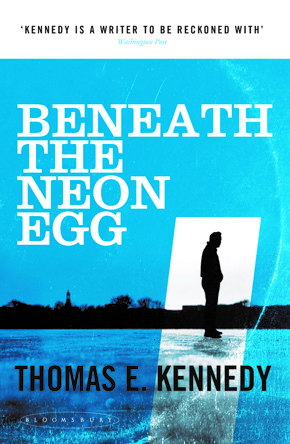Dear Katherine
by Thomas E. KennedyMy father was a great reader. He often sat in his blue armchair in the corner of the living room, legs crossed at the knee, sipping a glass of ginger ale, reading a book. One evening when I was fifteen, I looked in on him and asked if he had something he might recommend for me to read. My father lay his book, splayed open, on the arm of his chair, stood and browsed among the shelves of his bookcases, paused, opened the glass door of one and slid out a thick hardback with a red cover and black spine. I asked what it was, and he said, “It’s a novel. Give it a try.”
Crime and Punishment by Fyodor Dostoevksy. I brought it up to my room, lay on my bed, bunched the pillow beneath my head and began to read. Within two pages, I was hooked. Thenceforth I was never without a book. It seemed to me that reading was like being admitted into the private world of the author’s mind. In that way, I might discover and learn to understand the hidden world inside me.
That’s how I started reading. Another evening, two years later, in my room with a fat anthology of short stories, I happened to read a story by someone named Katherine Mansfield. It was entitled ‘Miss Brill’ and was very short, only 5½ pages. Miss Brill is an old woman whose main pleasure in life is dressing up to go out to the public gardens on Sundays, and the people in the gardens are like her family, although she doesn’t really know or speak to any of them. But she listens to snatches of conversation and feels as though she is involved, and the light is beautiful and makes her feel she wants to sing, as though everyone is about to sing, as she sits on her customary bench, discreetly observing all the people around her. Then a beautifully dressed boy and girl sit down nearby, clearly in love, and Miss Brill hears them muttering devastatingly unkind things about her, about her appearance, about why she even bothers to come to the public gardens, about why she even bothers to live. And Miss Brill returns home to her little dark room and sits for a long time and thinks she hears “something crying”.
This writer had reached out from beyond the grave to take hold of my heart and squeeze a profound, hidden sorrow from it. Slowly, I began to understand.”
So hurt did I feel by this story that I flung the book across my little room and sat there for a long time on the edge of my bed, furious that I was unable to do anything to help or comfort this poor lonely old woman or to reprimand the young couple who had acted so thoughtlessly, who had with a few cruel careless words snatched away Miss Brill’s only joy of life.
It seemed to me that Katherine Mansfield was responsible for this, for what I was feeling. At least I could contact Katherine Mansfield. I could muster whatever power of words was available to me and write her a letter, scolding her for creating this lamentable situation. I retrieved the book from where it had landed beneath my rickety writing table, flipped it open to find out where I could get hold of this cruel writer, and I learned that Katherine Mansfield had been born in 1888 and had died in 1923. She had been dead for nearly forty years.
All at once it seemed to me that this writer had reached out from beyond the grave to take hold of my heart and squeeze a profound, hidden sorrow from it. There was no one to blame, no one to tell off. There was only me and the story, the injured old woman, the thoughtless young boy and girl. Then, slowly, I began to understand. This story was an illumination of life. It went beneath the surface and made it possible for us to see, to comprehend the meaning of things, the meaning of this isolated, fictional event one Sunday afternoon in the public gardens, how we hurt one another without a thought. It had made that moment of pain eternal, an eternal reminder, an eternal understanding.
And I realised that this was what I wanted, the only thing I wanted to do. To write. To try to develop this power to make people see, to make myself see.
 Thomas E. Kennedy is the author of over 25 books, most recently ‘The Copenhagen Quartet’, four independent novels set in the Danish capital, each written in a different style and set in a different season. The latest, Beneath the Neon Egg, is published by Bloomsbury. Read more.
Thomas E. Kennedy is the author of over 25 books, most recently ‘The Copenhagen Quartet’, four independent novels set in the Danish capital, each written in a different style and set in a different season. The latest, Beneath the Neon Egg, is published by Bloomsbury. Read more.
copenhagenquartet.com


